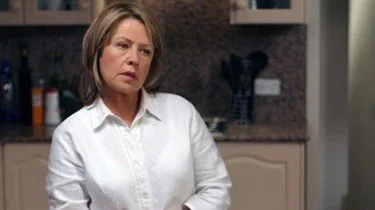Noni Hazlehurst - Australia’s Mother
Sunday (1/26/2025) is Australia Day so what better time to celebrate Noni Hazlehurst, one of Australia’s national treasures? The versatile actress began her career during the Australian film renaissance of the 1970s but one of her most recognizable roles is that of presenter on the children’s television show “Play School”. Hence Hazlehurst’s nickname “Australia’s Mother”. While Hazlehurst finds the moniker “weird” she does not avoid roles that reinforce the perception. She is currently the star of a one-woman play entitled “Mother”, recently performed in Melbourne.
It should not be inferred, however, that Hazlehurst’s maternal roles are stereotypical or limiting for the actress. Her character in “Mother”, for example, is a troubled homeless woman. Two Aussie films I viewed this month, from different eras of Hazlehurst’s career, highlight the disparate characters she has played that fall under the complex classification of “mother”.
“Monkey Grip” (1982) is set in the bohemian world of Melbourne’s artistic community in the late 1970s. Hazlehurst’s character Nora is uninhibited, welcoming her eleven-year-old daughter Grace (Alica Garner) into her room at any hour, no matter which male lover happens to be currently sharing her bed. Although the film is episodic in form (as is Helen Garner’s novel from which the movie is adapted), the main storyline concerns Nora’s obsessive, and somewhat inexplicable, romance with a heroin addict. Javo (Colin Friels) has nothing to offer other than the sensual pleasures Nora derives from their lovemaking.
Nora (Noni Hazlehurst) looks distracted as her daughter Grace (Alice Garner) discusses her day at school.
Javo is unfaithful, but then so is Nora. There is a pervasive fatalism that infects her life despite, or perhaps because of, its indulgences. She excuses Javo’s behavior by saying, “Everyone’s got patterns they can’t break.” For Nora, that means making no concessions to her occupation as a mother. Grace disappears from the screen for long intervals as Nora parties and pursues a career as a writer. Her parenting style is to treat her daughter as a fully-formed adult, capable of seeing herself off to school and organizing her time. Grace’s father appears in only one scene, but he seems as nonchalant as Nora in his parenting style.
The affair eventually ends but Nora experiences no regrets. Her voice-over narration is meant to elucidate and justify her actions, but Nora still comes off as a self-absorbed young woman. Writer Helen Garner, who collaborated on the script with director Ken Cameron, sees addiction as a type of masochism; whether that addiction is drugs (Javo) or romantic love (Nora). When the masochist is a parent, however, more than one person experiences the hurt.
The theme of addiction carries over to “Bitter & Twisted” (2008). The film opens with a young man dying from a drug overdose on his family’s living room floor. His father Jordan (Steve Rodgers), reeling with grief, develops a food addiction. He takes daily breaks from his job as a failing car salesman to sit on his son’s grave and consume mass quantities of take-out. Hazlehurst plays his wife, Penelope. She keeps her grief in check, maintaining the household for her husband and two remaining children.
Noni Hazlehurst as middle-aged suburban mom, Penelope Lombard.
As the story unfolds, however, cracks appear in Penelope’s polished exterior. Her husband has lost his sex drive, making Penelope feel unattractive. Discovering she has entered menopause causes additional agitation. Then, while doing laundry, Penelope finds a note in her teen-age daughter’s jeans that suggests she has become sexually active. Attempting to have a mature conversation with her daughter about the topic, Penelope begins banging her head against the door jamb, disconcerting herself and her child.
“Bitter & Twisted” suffers from shifting its perspective from the parents to their son, Ben (played by the writer-director of the film, Christopher Weekes) and his pursuit of his dead brother’s ex-girlfriend. The film gets back on track after the father, Jordan, suffers a heart attack on the job and lands in the hospital. In the film’s most effective scene, with the two most experienced actors, Penelope breaks down in tears. The parents are finally able to articulate their grief and their feelings towards each other.
There is also a scene in “Monkey Grip” that requires Noni Hazlehurst to sob with abandon. She is so genuine when crying onscreen, that even when her character is unlikable, the viewer still feels her pain. Hazlehurst, in her 2024 memoir “Dropping the Mask”, explains the reason behind this, I think. She states that the only way to engage an audience is “to be, not to act.” Her performances in “Monkey Grip” and “Bitter & Twisted” are indicative of her cinematic authenticity.
Content copyright © 2025 by Angela K. Peterson. All rights reserved.
This content was written by Angela K. Peterson. If you wish to use this content in any manner, you need written permission. Contact Angela K. Peterson for details.


